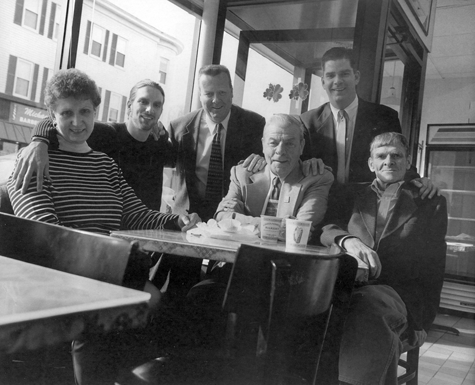November 20, 2012
 The Walsh clan at Greenhills in 2000: from left Mary Walsh, John Walsh, Marty Walsh, Pat Walsh - who passed away last week - Rep. Martin J. Walsh and his father, the late John Walsh. File photo
The Walsh clan at Greenhills in 2000: from left Mary Walsh, John Walsh, Marty Walsh, Pat Walsh - who passed away last week - Rep. Martin J. Walsh and his father, the late John Walsh. File photo
On Election Day, while most of Dorchester was beating a path to the polls, one of the neighborhood’s political heavies lay dying in a bed on Neponset Avenue. Pat Walsh had been gravely ill for many months and had told all who would listen that he was ready to go. But, even on his deathbed at age 90, he kept close track of “the game” he loved— especially the brewing showdown for US Senate between Elizabeth Warren and Scott Brown.
The union that he built into one of the city’s strongest — Laborers 223, which is now led by his son Marty—endorsed the Democrat way back in October 2011. The Laborers — along with other workers mobilized by his nephew, state Rep. Martin Walsh — formed the sturdy backbone of Warren’s ground forces in Boston long before the candidate caught fire in the polls.
So when the candidate herself made a final swing through the city on Election Day, it was no surprise that she stopped at the GOTV beehive at the IBEW hall on Freeport Street. And when Elizabeth Warren finished her round of handshakes and photos at the union hall, she made it a point to swing by Pat Walsh’s house to thank him in person.
“I’m not sure that he really knew who she was at first,” recalled Rep. Walsh, who was there for the brief meeting. “Pat was pretty far along. But she came up to his bed and grabbed his hand and said, ‘Pat, I’m Elizabeth Warren. And I just wanted to say thank you.’ ”
Pat thanked her back and then, as she left the room, offered the candidate the first taste of a word she’d hear many more times that night: “Congratulations,” Pat said to her. “Pat knew at 2:30 that day that she’d be the next senator,” said Rep. Walsh.
Pat Walsh died last Thursday and was buried in Cedar Grove Cemetery after a funeral Mass at St. Margaret’s Church on Monday morning. The wake at Murphy’s on Dot Ave. was a two-day blockbuster, with long lines snaking around Belfort Street. Florists from across New England had a banner weekend. Massive arrangements adorned every nook and cranny of the stately funeral home. Most were from brother unions— the Carpenters, the Ironworkers, the Plumbers— they were all represented.
The most poignant carried cards from individuals who had no doubt benefited from Pat’s good deeds in some distant moment when a nod from Pat brought a union card, a day’s pay, and maybe a lift to a job site and home again.
“Thanks for all that you’ve done for the working man,” read one such note.
Pat came to Boston in 1949 and was followed not long after by his brother (Rep. Walsh’s dad, John, who passed away last year). The Walshes hailed from Callowfeenish, a rocky and isolated village in County Galway’s Connemara region— a place where people spoke their native tongue and cut turf from nearby bogs to fuel their hearths.
In a 2000 interview with former Reporter editor Eoin Cannon, Pat Walsh recalled that “things were very hard in Ireland back then. They weren’t as good in this country as they are now, either. You had to find your own work.”
Once settled in Boston, Pat found work where he could: on the docks and railroads and in the factories of post-war Boston. He never forgot the struggles of those lean years. And when he clawed and cajoled his way up the ranks to business manager, the most powerful spot in the union, he made sure that he helped his fellow Irish by the thousands get an even shot at work.
He helped men of all backgrounds, of course, but there was no secret – and no apology – for the shamrock that adorned the Local 223 bumper stickers. It was clearly “the Irish union.” Said Rep. Walsh: “He defended his men without hesitation. He was always fighting to get one more job.”
Pat had a tough edge and the salty tongue that you’d expect from a guy who had to slug it out with foremen, developers and, sometimes, other union chiefs. To the end, Pat was a fighter for the workingman and a staunch Democrat— even when he didn’t love the candidate. When he “retired” and passed his union baton to his son Marty, he did daily battle over cups of coffee with anyone who’d dare take the bait at his favorite haunt, Greenhills in Adams Corner.
His nephew, who was on the receiving end of Pat’s way with words more than once, laughed as he said, “He didn’t like you if he wasn’t yelling at you. He was a fighter to the end.”


